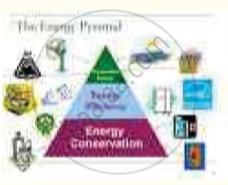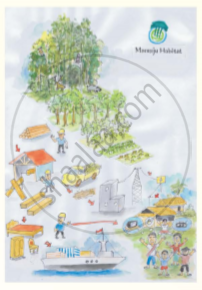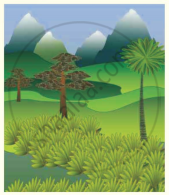Advertisements
Advertisements
प्रश्न
In Question 3, you read an eye-witness account of a robbery. On the basis of your reading of the Birlstone tragedy, in about 125 words, write Dr Wood's account of the discovery of John Douglas's body.
उत्तर
It was approaching midnight when I got a call from Mr. Barker that Mr. Douglas had been murdered. I rushed towards the scene. To my great surprise the drawbridge was down which should have been up at this hour of the night. When I reached the scene of the murder I could see Mr. Douglas’ body lying spread out near the fireplace. His head was towards the fireplace. There was Mr. Barker in the room but Mr. Douglas’ wife was in another room. She was too shocked to see the dead body.
When I asked Mr. Barker he said that the door was open when he arrived on the scene and it was he who lowered the drawbridge. He also said that usually at 6 pm the drawbridge was put up so that nobody could enter the manor during night. There was a doubt in my mind that somebody might have entered before 6 pm and hid himself somewhere in the manor to wait for the right time to execute the crime. Mr. Barker and Douglas’ wife needed to be investigate nobody can be beyond suspicion. Proper investigation needs to be done to solve this murder mystery.
APPEARS IN
संबंधित प्रश्न
Write about the following memories or experiences. Share your views with the
class.
Answer the following question briefly:
What did the Professor mean by “intelligent reading”?
The following is a flow chart showing the course of the brook. Can you fill in the
blank spaces with help from the phrases given below?
a) passes under fifty bridges; b) comes from the place where coots and herons live;
c) passes lawns filled with flowers; d) crosses both fertile and fallow land; e) goes
through wilderness full of thorny bushes
Answer the following question.
a) "…But up-and-down brushin'
And pokin' and fussin'
Didn't seem worth the time-I could bite!"
What do these lines convey?
Simple Past and Past Perfect
Complete this story by Julius Lester. Choose the correct forms of the words
given in the brackets.
Brer Rabbit (a) ________ (decidedI had decided) gardening was too much hard work. So he (b) ________ (had gone/went) back to his old ways of eating from everybody else’s garden. Earlier, he (c)________ (made/had made) a tour through the community to see what everybody (d)________ (had been/was) planting that summer and his eye (e) ________ (was/had been) caught by Brer Fox’s peanut patch.
That night Brer Rabbit (l) _______ (came/had come) down to the peanut patch. He climbed through the hole and WHOOSH ! Next thing he (m) _______ (had known/knew), he was hanging in the air upside down. There (n) ________ (wasn’t/hadn’t been) a thing he could do, so he made himself comfortable to catch a little sleep!
Answer the following questions based on the story you have read.
(a) What had Brer Rabbit found out?
(b) What did he do when the plants grew?
(c) How did he enter Brer Fox's peanut patch?
(d) Brer Fox had an idea of who was stealing from his patch. What did he do to trap
Brer Rabbit?
You must have used the simple past tense and past perfect tense in your
answer. Do you know most often, when you use the past perfect, you use it with
the (simple) past?
Study the sentences from the story and write whether (a) the action happened
before the action mentioned in the simple past tense, or (b) an action happened
after the action mentioned in the past perfect tense.
(e.g.) Brer Rabbit had decided _(a)_ gardening was _(b)_too much for him. So,
he went __ back to his old ways. Earlier, he had made __ a tour through
the community to see what everybody had been __ planting that summer
and his eye was __ caught by Brer Fox's peanut patch.
Edit the following narrative by choosing the appropriate word from the options given at the end of the paragraph.
(a) Wander along the streets of New York City, my daughters and (b) me stop at shoe stores wherever we (c) happens to be. This is their choice. These women, who as little (d) girl, teetered around the house (e) balances like cranes in my mother’s high heels. I (f) sits on the bench and wait while they try on shoe (g) on shoe readjusting their positions in (h) a mirror, eyes downcast considering their feet.
“So?” one of them (i) will ask me. “What do you think of these?” “I love them,” I say about (j) all pairs.
| (a) (i) wandered (ii) wandering (iii) were wandering (iv) was wandering |
| (b) (i) they (ii) I (iii) we (iv) us |
| (c) (i) happen (ii) happened (iii) are happening (iv) are happened |
| (d) (i) girls (ii) woman (iii) boys (iv) people |
| (e) (i) are balancing (ii) is balancing (iii) balanced (iv) balance |
| (f) (i) sit (ii) am sitting (iii) sat (iv) was sitting |
| (g) (i) after (ii) before (iii) in (iv) by |
| (h) (i) that (ii) the (iii) their (iv) x |
| (i) (i) is asking (ii) asks (iii) are asking (iv) asked |
| (j) (i) every (ii) few (iii) some (iv) a |
In groups, work on one of the topics mentioned in 8(a)-(g). Research your topic by collecting relevant articles from the print and electronic media (like the National Geographic). Make a power point presentation of 10-12 minutes. You can also use film clippings to enrich your presentation.
(a) SOLAR MISSION
1) To promote the use of solar energy through solar photovoltaic and thermal systems for power generation .
2) To integrate other renewable energy technologies like biomass and wind. 
(b) ENERGY EFFICIENCY
1) To mitigate GHG through sector-specific and cross-cutting technology and fuel switch options.
2) To use more LNG and biomass fuels besides seeking tech transfer. 
(c) SUSTAINABLE HABITAT
1) To promote energy efficiency in the residential and commercial sectors through LPG use.
2) To manage municipal solid waste and urban public transport in a better way. 
(d) WATER MISSION
1) To promote efficient water use, augment supply in critical areas and ensure effective management of water resources.
2) To have better management of surface and groundwater,and conserve wetlands. 
(e) SUSTAINING HIMALAYAS
1) To enhance monitoring and conservation of the Himalayan ecosystems, empower local communities for management of ecological resources and promote sustainable tourism. 
(f) GREEN INDIA
1) To reduce fragmentation of forests, enhance public and private investments for plantation, upscale joint forestry management and promote conservation of biodiversity. Need to afforest degraded lands.

(g) SUSTAINABLE AGRICULTURE :
1) To focus on four crucial areas - dry land agriculture, risk management, access to information and promoting the use of biotechnology.
2) To develop drought and pest resistant varieties. 
Saving the World.
What do you think ought to be done about these problems?
should
e.g. I think the Government should ban all sprays which destroy the ozone
layer.
Answer the following question by ticking the correct option.
Cecil Barker's first reaction at the sight of the dead Douglas was to _____
Here are the stories of the two boys. One student reads the story of Shravan Kumar and the second student reads the story of Narendra Kumar. After reading the story, each student completes bis or her half of the table in Question 3.
SHRAVAN KUMAR
His day begins when most other people's day ends. Thirteen-year old Shravan Kumar works in a tea shop on Delhi's Bahadur Shah Zafar Marg, where several newspaper offices are situated. His work begins around seven in the evening when he starts preparing samosas, coffee and tea. He carries them to several offices, does the dishes, and goes around collecting his money well into the night. Around six in the morning, when all the newspapers are despatched for distribution and the press employees return home, he prepares his food, takes a bath and goes to bed.
Shravan is an orphan who crune to Delhi from his village in search of work. His father kept a shop, but was tricked out of it by a deceitful uncle. Despair drove him to alcohol and grunbling, and he died of a stroke soon after.
Shravan worked in a tea shop in his village for a while. "When I first began washing other people's cups and glasses", he recalls, "I used to feel very bad, I would cry."
Shravan moved to the more lucrative environs of Delhi, where his elder brother Shatrughan had preceded him. Ajob in a shop selling ice was his first taste of big city life. His mother crune to visit him in Delhi, but she fell ill and died soon after. "That was two or three years ago. I don't remember exactly when," the little boy says. Soon, Shravan lost his first job. His employer still owes him Rs 500.
Following a brief spell of unemployment and a short spell as an assistant at a car park, he joined the tea shop where he is presently employed. The ruthlessness and loneliness of the world has left him shattered. "I think I run all alone in this world," he says despondently.
Of the Rs 300 that he earns every month, he deposits Rs 200 in the bank. His bank balance stands at Rs 2000, he says proudly. Survival is his immediate aim but there is a larger objective towards which Shravan is working. He intends to retrieve the land that was mortgaged by his father. Already Shravan and Shatrughan have paid back the loan of Rs 8000 - only the interest remains to be paid.
Shravan was a dedicated lotte:ry buyer at one time; until he realized that it was adding nothing to his income. The cinema remains a favourite form of entertainment - he even wakes up early to see the noon show. "I have no friends here. Who keeps awake late at night and sleeps during the day? I miss my village. There, I used to play gully danda and marbles and I had a lot of friends. When I went to the village last year, I met them. They are still studying and playing games. I want to join them, but it is a question of survival for me."
Sharvan's mother wanted him to own a big shop - "like the one his father had owned," he says wistfully. He dreams of fulfilling her wish. He dreams of getting back their mortgaged land, and returning to the village for good, "I like being in my village. I like the films and the glitter of Delhi, but I prefer the greene:ry, the trees, and the fields of my village." Maybe the grit and intelligence he has shown, alone and friendless, in facing a hostile world, will also win for him his heart's desire.
NARENDRA KUMAR
Narendra Kumar, a thirteen year old Kendriya Vidyalaya student, was interviewed by The Illustrated Weekly of India. Read what he says about himself.
Interviewer : Hello, Narendra!
Narendra : Hello!
Interviewer : Congratulations! Narendra. I saw your photograph in the newspaper last week, when you won the Soviet Land Nehru Award for drawing and painting. Our readers are anxious to know more about you.
Narendra : Thank you, Sir. I think I was just lucky to get the award. The competition is held every year in my school and a large number of students take part in it.
Interviewer : That's good, very good. It's evident that your school encourages students to take part in various activities.
Narendra : Oh yes. Our teachers -especially my Art teacher, Mr. V. Sinha - gives us a lot of encouragement. My parents have encouraged me a lot, too.
Interviewer : When did you start painting?
Narendra : When I was three, I was attending the Shishu Vihar Nursery School. My teacher gave me a picture of a big kite one day. The picture was beautiful and that very day I asked my father to buy me some crayons and drawing paper... Soon my room was full of crayons and paper! I kept drawing whenever I found time. I now have a mini art room of my own at home!
Interviewer : That's great, really great! Do you want to become an artist when you grow up?
Narendra : No. Drawing and painting are just hobbies, which give me a great deal of pleasure. I want to become a police officer when I grow up. That's the only thing I've ever wanted to be.
Interviewer : Is that because your father is a police officer?
Narendra : Yes, maybe. I've been watching my father and other policemen for a very long time. I suppose I want to be like him!
Interviewer : Do you feel you have the qualities that a good police officer needs?
Narendra : Yes, I think so. A good police officer needs to be physically fit and mentally alert. I'm trying my best to grow into a healthy young man. I'm a member of the local sports club. I play tennis in the evenings and I also swim regularly.
Interviewer : How do you find time for all these activities?
Narendra : Well, I suppose I'm busy the whole day. Immediately after school I like to paint or play. I study before dinner and usually get to bed at about 10 o'clock.
Interviewer : Thank you, Narendra. It's been good talking to you. We wish you success.
Narendra : It's been a pleasure
